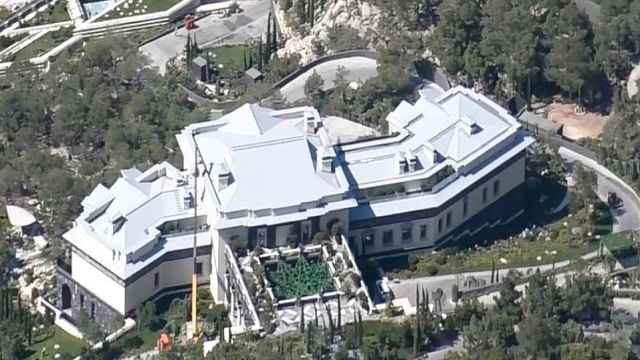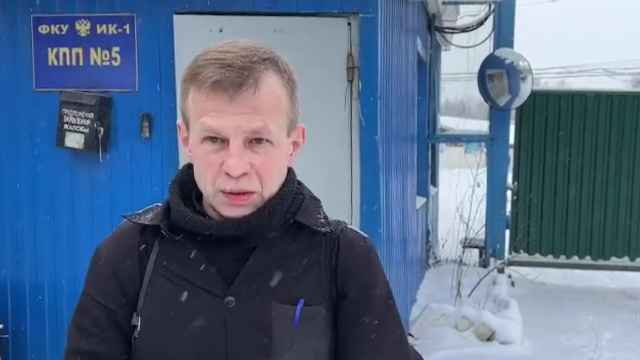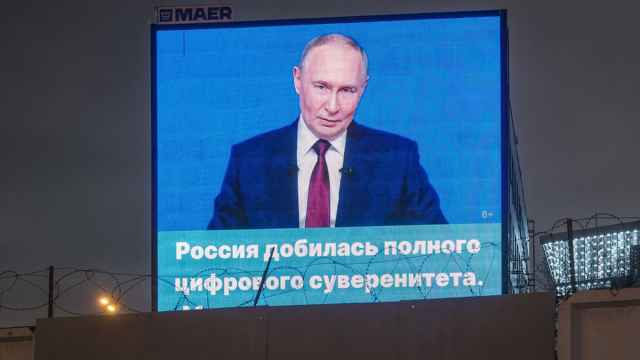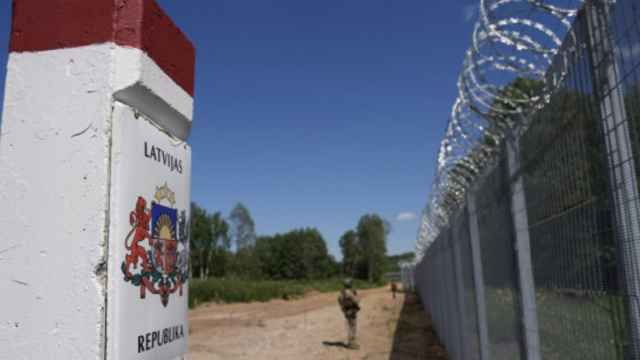The crisis in Ukraine dominated the past week's main news roundups on Russia's leading television channels.
The coverage, which was virtually wall-to-wall, essentially delivered four key messages: Crimea and Russia have a shared history that goes back centuries; the new authorities in the Ukrainian capital, Kiev, are beholden to neo-Nazis, oligarchs and the West; the Russian government and the Russian public are united in their support for people living in Crimea, for Ukraine's Russian-speakers and for the "fraternal people" of Ukraine as a whole; and the West is a disruptive influence in Ukraine, its politicians and diplomats meddling while its media deliberately mislead their audiences.
The end-of-week news roundups on Russia's three main television channels — state-controlled Channel One, official state channel Rossia 1 and Gazprom-Media's NTV — all ran for at least 50 percent longer than usual, and focused almost exclusively on the crisis in Ukraine. Early on in Rossia 1's "Vesti," presenter Andrei Kondrashov said that it had been "yet another week of the most acute political crisis" in Ukraine. "There's nothing to compare it with," he observed. "The population of our countries has never been so drawn to the news."
Crimea 'has the right to determine its own fate'
Coverage of the situation in Crimea, where the local parliament has voted in favor of the peninsula becoming part of Russia, and where a referendum on the issue has been scheduled for March 16, very much stuck to the Kremlin line. Report after report conveyed the message that Crimea was quite capable of managing its own affairs independently from the new Ukrainian government in Kiev, that Crimeans were keen on being part of Russia and that, in effect, Crimea and Russia belong together.
The presenter of Channel One's "Voskresnoye Vremya" roundup, Irada Zeynalova, spent part of the week in Crimea gathering material. The report she produced showed local people attending pro-Moscow rallies, saying they felt under threat and emphasizing how keen they were on being part of Russia. "We haven't worked for 10 days, because we had to defend ourselves," said one woman. Another woman was shown saying: "All we want is to live in friendship with Russia, so that we don't quarrel with our neighbours. At any rate, Russia is our mother, that's what everyone here thinks." Zeynalova, meanwhile, stressed that Russia was supporting Crimeans, while the West was acting "extremely emotionally" by targeting Russia with sanctions. "Not a single Western politician has remembered that Crimea has the right to determine its own fate," she complained.
Later on in her report, Zeynalova suggested that, at least in spiritual and emotional terms, Crimea was somehow separate from Ukraine. "Here, things have always been, are and will be different from the way they are in Ukraine," she said. "There is something that people who grew up on land heavy with lead from many wars have imbibed with their mother's milk: there's nowhere to retreat to." Then, looking ahead to the referendum, she said that, whatever the outcome of the vote, "life here on the peninsula will never be the same again."
Almost exactly the same message could be heard from Andrei Kondrashov, the presenter of Rossia 1's "Vesti" news roundup. "However the referendum turns out, Crimea, as the Americans like to put it, will never be the same again," Kondrashov remarked. In his view, the authorities in Crimea had no choice other than to call a referendum: "The radicalization of Kiev's actions … forced Crimea to take a decision more quickly and more sharply."
Reports later on in the "Vesti" roundup sought to underline Crimea's closeness with Russia. Maxim Kiselev's report from Sevastopol, home to Russia's Black Sea Fleet, stressed that the city had played a prominent part in Russian history. Later on in the bulletin, another report looked back at Crimea's history, arguing that, in the past, various foreign powers, including Turkey, France and Britain, had tried to prevent the peninsula from being part of Russia. The man fronting the report was Alexei Denisov, the documentary-maker behind a program, originally shown in 2008 and rebroadcast on March 7, about Grigory Potemkin, the 18th-century prince who presided over the Russian empire's annexation of Crimea and founded Russia's Black Sea Fleet.
Ukraine takes 'step to the right'
Reporting on the situation in Ukraine as a whole, the main news roundups gave the impression that the new authorities in Kiev were allowing their political agenda to be set almost exclusively by right-wing political parties and far-right paramilitary groups. Presenters and correspondents likened the best-known of those groups, Right Sector, to the Nazis, and accused the West of turning a blind eye to the threat of "extremism."
On Channel One, presenter Irada Zeynalova said that Ukraine is "taking a step to the right." Right Sector, she went on, is "in many ways playing a defining role in Kiev," for example by influencing ministerial appointments. Presumably referring to the group's leader, Dmytro Yarosh, and one of its highest-profile members, Oleksandr Muzychko, the program spoke of "Ukraine's Gauleiter," the leader of a regional branch of the Nazis. Reporting from Kiev, correspondent Mikhail Akinchenko took this analogy further. He alleged that leaflets had been pinned to the front doors of the homes of ethnic Russian families in the western Ukrainian city of Lviv, something that he found to be "very similar to Stars of David being drawn on Jewish homes during World War II."
The message was much the same on Rossia 1. Presenter Andrei Kondrashov said Right Sector was in the process of "sharing its plans to build a racially pure state" and trying to negotiate access for its activists to army arsenals. "The absurdity of the situation borders on tragedy," Kondrashov remarked. Drawing a further parallel with Germany in the 1920s and early 1930s, correspondent Yevgeniy Rozhkov added that "where the authorities are weak, radicals come to the fore, and they plan to establish their own order." To reinforce the channel's message that dangerous people were now in charge in Kiev, Rozhkov's report from Ukraine included footage of Muzychko apparently trying to intimidate prosecutors, and also touched upon the story of a journalist who said he had been beaten up and tortured because he had refused to pledge allegiance to Right Sector. To ram home the point, Rozhkov rounded off by saying that the new Ukrainian authorities "are continuing to wait for help, a! nd it doesn't matter where it comes from … they've admitted that they will agree to even the most enslaving terms."
Rossia 1's attack on the new Ukrainian government did not end there. Kondrashov argued that the supporters of the Maidan protest movement had failed to get what they wanted, even though their leaders are now in power: "They wanted European values, what they got was neo-Nazism. They wanted order, what they got was anarchy. They wanted an honest government, what they got, through the spilling of blood, was an illegitimate junta."
Meanwhile, NTV's "Itogovaya Programma" ran a report that reviewed 20th-century Ukrainian history and condemned Ukrainian nationalists, particularly wartime nationalist leader Stepan Bandera, who was branded a "terrorist" and Nazi ally. Presenter Kirill Pozdnyakov described Yarosh and Muzychko as the "grim offspring" of the Ukrainian protest movement, before complaining that there had been "no international reaction" to allegations that Yarosh had said he wanted North Caucasus insurgency leader Dokka Umarov to arm anti-Russian fighters.
Media 'hysteria'
Just as coverage of events within Ukraine ranged from strong support for the Crimea referendum to acerbic criticism of the new authorities in Kiev, so accounts of the response to the crisis from outside the country ranged from highly positive coverage of Russian policy and Russian public reaction to dismissive accounts of the part played by the West.
Channel One's "Voskresnoye Vremya," which normally goes out on Sundays but on this occasion went out a day later, on Monday, March 10, showed Russian Foreign Minister Sergei Lavrov briefing President Vladimir Putin on his diplomatic contacts and saying that he was not satisfied with proposals he had received from U.S. Secretary of State John Kerry. All the roundups reported that Putin had discussed the Ukraine crisis by phone with other world leaders, such as U.S. President Barack Obama and German Chancellor Angela Merkel. They also showed extensive excerpts from Putin's March 4 news conference, his first public remarks on the crisis after armed men, looking very much like Russian soldiers but described by the Kremlin as "self-defense groups," surrounded Ukrainian bases in Crimea.
Plenty of attention was also paid to a series of rallies that took place in cities across Russia over the course of the week. These were variously described as being in support of Crimea, in support of Russians in Ukraine or in support of the "fraternal Ukrainian people," and were held in cities, as Channel One put it, "ranging from Moscow to Russia's very borders."
In contrast, the actions of the West, whether through its leaders or its media, were portrayed in a relentlessly negative light. One angle of attack focused on the leaked recording of a telephone conversation between Estonian Foreign Minister Urmas Paet and EU foreign policy chief Catherine Ashton, in which Paet referred to an "increasing understanding" that then President Viktor Yanukovych's government was not responsible for the deaths of police and protesters at the hands of snipers during clashes in and around Kiev's Independence Square in February. Channel One's Zeynalova said pointedly that the West "preferred to keep quiet" about the conversation. On NTV, correspondent Sergei Kholoshevsky dismissed the view that the snipers were Berkut special police officers, and suggested instead that the then opposition may have been involved. There were also reports in some of the news roundups that 300 "mercenaries" had arrived in Kiev, supposedly to provide support for the new government.
Another area explored specifically by Channel One was the idea that Russia was the victim of a propaganda war being waged by Western governments and the mainstream Western media. According to presenter Irada Zeynalova, Russian journalists working in Ukraine "have already started receiving threats." In the report that followed, correspondent Pavel Pchelkin accused various Ukrainian TV channels, as well as a range of Western media outlets, of deliberately misleading their audiences over what was happening in Ukraine. "There's a reason why we're speaking about the dangerous role played by media in conflicts," he said. "There's such a thing as the CNN effect, when a hysteria promoted in the media means politicians cannot stop themselves."
'Pandora's box'
Although there were plenty of commentators telling the main Russian television channels why they agreed with Russian policy on Ukraine, there did not seem to be anyone around to question that policy. For that you had to turn to outlets such as the Gazprom-owned, editorially independent Ekho Moskvy radio station. One of Ekho Moskvy's resident commentators, Yulia Latynina, rounded off the latest edition of her regular "Access Code" program with the following remarks: "The Kremlin has opened a pretty frightening Pandora's box, in which it is once again he who is ready to use force that wins. In that sort of world, in strategic terms, the state of the Russian army is not good enough for Russia to hope to score a conclusive victory."
March 12, 2014 / BBC Monitoring / ©BBC
A Message from The Moscow Times:
Dear readers,
We are facing unprecedented challenges. Russia's Prosecutor General's Office has designated The Moscow Times as an "undesirable" organization, criminalizing our work and putting our staff at risk of prosecution. This follows our earlier unjust labeling as a "foreign agent."
These actions are direct attempts to silence independent journalism in Russia. The authorities claim our work "discredits the decisions of the Russian leadership." We see things differently: we strive to provide accurate, unbiased reporting on Russia.
We, the journalists of The Moscow Times, refuse to be silenced. But to continue our work, we need your help.
Your support, no matter how small, makes a world of difference. If you can, please support us monthly starting from just $2. It's quick to set up, and every contribution makes a significant impact.
By supporting The Moscow Times, you're defending open, independent journalism in the face of repression. Thank you for standing with us.
Remind me later.





